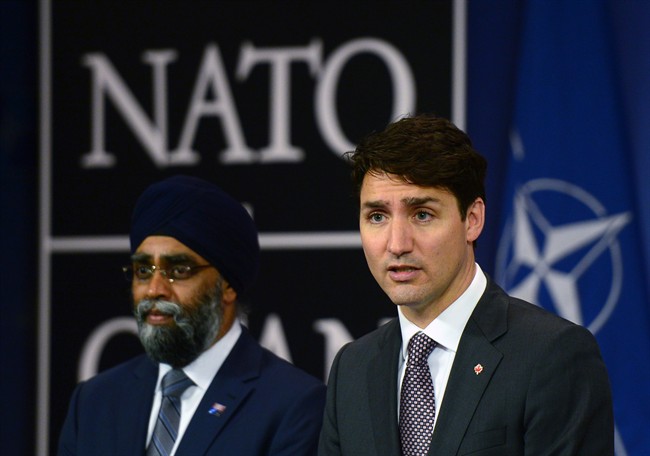The government of Canada put up some big numbers on Wednesday as it unveiled its new defence policy.

But there was one number conspicuously missing.
Even with a huge boost in military spending planned over the next decade (some of it back-loaded), Canada will still fall short of spending two per cent of its gross domestic product (GDP) on national defence by 2024-25.
READ MORE: Canada to use armed drones, cyberattacks to respond to global security threats
The documents released Wednesday predict that by that year, spending as a percentage of GDP will sit at only 1.4 per cent.
“While defence spending is an important part of ensuring appropriate defence capability, it is not the most effective measure of fair burden sharing,” the policy reads.
It then cites Canada’s involvement in ongoing NATO missions and readiness to “deploy and sustain” troops if needed as examples of other ways that the country contributes to the alliance.
Canada has no formal obligation to hit the two-per-cent benchmark. In 2014, NATO members simply agreed to work toward that spending objective over the next decade and technically, Ottawa is fulfilling that obligation by moving the needle.
WATCH: Defence spending to increase by 70 per cent by 2027

Recent estimates have put the current spending level at just over 0.9 per cent, one of the lowest numbers for any NATO member nation.
But the government said Wednesday that’s not quite accurate. The estimate ignores defence-related spending in other departments, according to the documents, so the actual number for 2016-17 is 1.19 per cent of GDP. The injection of new money over the next nine years will then push it to 1.4 per cent, the Liberals maintain.
“Realistically that number is actually 1.2 (per cent) if you didn’t change the formula (and include other departments),” said Dave Perry, a senior analyst with the Canadian Global Affairs Institute.
“To give them credit they spelled all that out, those changes, and you can see all that detail.”
NATO secretary general Jens Stoltenberg released a statement Wednesday praising Canada’s “major planned investments” and “unwavering commitment to NATO.”
“In these challenging times, Canada’s commitment to the alliance is important as we work to keep our nations safe and NATO strong,” Stoltenberg wrote.
Still, the long-awaited plan unveiled in Ottawa by Defence Minister Harjit Sajjan may not be enough to appease individual NATO allies — especially the United States.
Over the last several months, the White House has made it clear that America will scale back its considerable investments in the alliance if countries like Canada don’t make more of an effort to reach the two-per-cent benchmark.
U.S. President Donald Trump went so far as to give his nation’s allies a public dressing down during recent meetings in Brussels.
WATCH: Donald Trump lectures Canada, other NATO members to up defence spending

There was also criticism on Wednesday from new Conservative leader Andrew Scheer, who told reporters that he would be on the lookout for “accounting tricks” that inflate defence spending by lumping in items that “haven’t normally been counted in defence spending.”
“Traditionally things like, you know, border services – border security, Coast Guard … some of the intelligence work that goes on in the RCMP,” Scheer said outside the House of Commons.
READ MORE: Canada deploys alternate numbers to defuse NATO defence spending situation
“If those are the types of things that they’ve now lumped in without actually putting in new dollars, I don’t think that’s a real commitment to the armed forces.”
Defence expert Perry said he was personally surprised by how much effort the government put into spelling out where Canada stands — and will stand — on the NATO commitment. He called it “a little disingenuous.”
“For a government that kept saying that that formula is irrelevant, that there’s other measures (for involvement), they sure went into a lot of detail to spell out exactly that formula and where we stack up,” Perry said.
-With files from Vassy Kapelos.
- ‘Shock and disbelief’ after Manitoba school trustee’s Indigenous comments
- Invasive strep: ‘Don’t wait’ to seek care, N.S. woman warns on long road to recovery
- Grocery code: How Ottawa has tried to get Loblaw, Walmart on board
- ‘Super lice’ are becoming more resistant to chemical shampoos. What to use instead




Comments